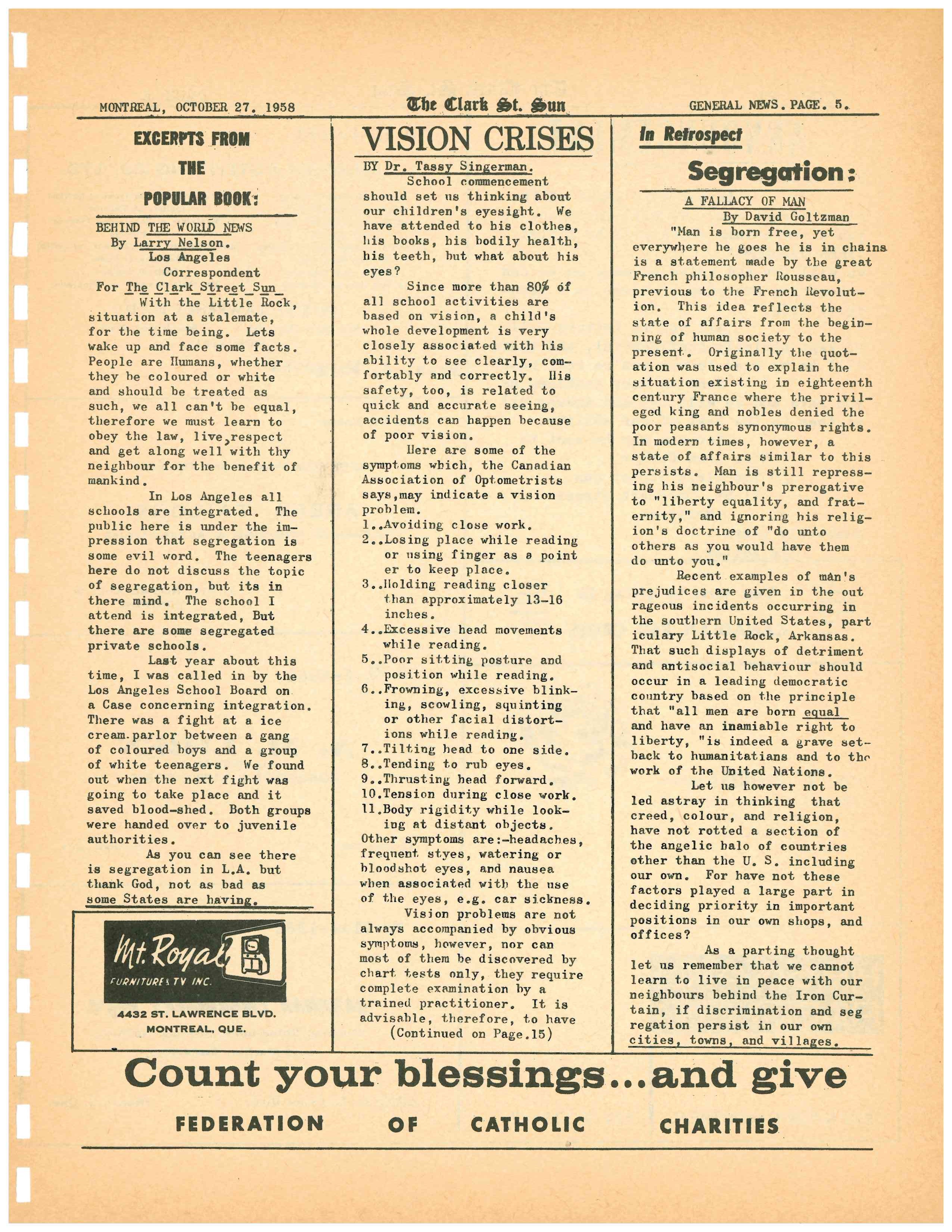Summer schedule from July 7 to August 29 inclusive
1957 -Clark Street Sun : Advocacy against segregation
In the right-hand column of this October 27, 1957 Clark Street Sun page, young collaborator David Goltzman offers a philosophical opinion piece that provides a brief but lucid reflection on the segregationist attitude of his society. The article, transcribed below, evokes two important historical elements of the 20th century.
The author first recalls the events — recent at the time — of Little Rock, Arkansas, the most important moments of the African-American civil rights movement, which took the form of a confrontation between the US State and the federal government. In 1957, advocates of racial segregation, including Arkansas Governor Orval Faubus, used racial arguments to prevent nine African-American students enrolled in Little Rock Central High School to pursue their studies. The President of the United States of the time, Dwight D. Eisenhower, called in the army to make sure the law was applied.
Goltzman also mentions the need to learn to live in peace with our neighbours living behind the “Iron Curtain”. At the time, the Western world was divided into two main political powers: those of the capitalist world (North America and the Western European countries, to keep things simple), and those of the Soviet Communist Bloc (countries east of Germany, Czechoslovakia, Hungary and Yugoslavia, including Russia, to keep things simple again). The “Cold War” is the conflict that opposed those two powers until the turn of the 1990s, when the Communist Bloc collapsed. In the fifties, the fear of a nuclear confrontation between the two powers prevailed.
Do these words from 1957 still echo in today’s world?
Sun Youth will always continue to fight against racism, segregation and social injustice.
———
(transcript)
In Retrospect
Segregation : A fallacy of man
By David Goltzman
« Man is born free, yet everywhere he goes he is in chains » is a statement made by the great French philosopher Rousseau, pervious to the French Revolution. This idea reflects the state of affairs from the beginning of human society to the present. Originally, the quotation was used to explain the situation existing in eighteenth century France where the privileged king and nobles denied the poor peasants synonymous rights. In modern times, however, a state of affaires similar to this persists. Man is still repressing his neighbour’s prerogative to “liberty, equality and fraternity,” and ignoring his religion’s doctrine of “do unto others as you would have them do unto you.”
Recent examples of man’s prejudices are given in the outrageous incidents occurring in the southern United States, particularly Little Rock, Arkansas. That such displays of detriment and antisocial behaviour should occur in a leading democratic country based on the principle that “all men are born equal and have an inalienable right to liberty,” is indeed a grave setback to humanitarians and to the work of the United Nations.
Let us however not be lay astray in thinking that creed, colour, and religion, have not rotted a section of the angelic halo of countries other than the U.S. including our own. For have not these factors played a large part in deciding priority in important positions in our own shops and offices?
As a parting thought, let us remember that we cannot learn to live in peace with our neighbours behind the Iron Curtain, if discrimination and segregation persist in our own cities, towns and villages.




